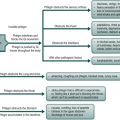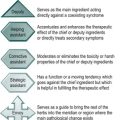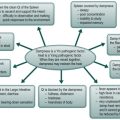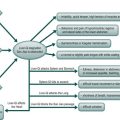2. Syndrome of Lung-Qi deficiency
Manifestations
Main symptoms
Shortness of breath, worse on exertion, a low and weak voice, reluctance to talk, spontaneous sweating, propensity to catch colds or having a common cold of long duration.
Secondary symptoms
Cough, phlegm, bright-white complexion, depression and lack of resolution and confidence.
Tongue
Pale with a white coating.
Pulse
Thready, superficial and rapid in the first position on the right side.
Associated disorders in western medicine
Common cold, influenza, chronic bronchitis, asthma, pulmonary emphysema, chronic sinusitis, skin disorders and depression.
Analysis of the syndrome
The Lung is a light, fragile organ that is unable to tolerate extreme dryness, cold or heat, and prefers to be moistened. Lung-Qi is generated from three sources:
• from the air, which is extracted by the Lung from inhalation
• from Nutritive-Qi, which is generated by food and drink by the transformation function of the Spleen
• from Defensive-Qi, which is generated by Source-Qi from the Kidney in the Lower-Jiao, strengthened by the Spleen-Qi in the Middle-Jiao and gathered in the Upper-Jiao.
Lung-Qi is formed by integrating the three kinds of Qi. It spreads over the whole body via its dispersing and descending functions. It stimulates or maintains the functions of the internal organs and vital activities of the whole body.
• When Lung-Qi is deficient, its dispersing and descending functions become weak. Patients may suffer from shortness of breath, which is worse on exertion, a low and weak voice and reluctance to talk.
• When the Defensive-Qi is too weak to control the pores and protect the body, spontaneous sweating, a propensity to catch colds and a common cold of long duration are often present.
• If the Lung-Qi fails to spread the fluid as mist in the Upper-Jiao, there may be cough with phlegm.
• The Lung houses the Po at a mental level. When Lung-Qi is deficient, depression and lack of confidence may exist.
• The pulse signs indicate the Qi deficiency, particularly in the Lung position, and there is a reaction of the weakened Lung-Qi to pathogenic factors.
Treatment principle: Tonify the Lung-Qi
Herb selection principles and formula composition strategies
• First, herbs that are sweet and moist, enter the Lung and Spleen meridians, and have the function of tonifying the Spleen-Qi and Lung-Qi without a harsh and drying nature are selected.
• Second, herbs that tonify the Kidney-Qi and herbs that tonify the blood and Lung-Yin so as to strengthen the Lung-Qi are selected.
• Third, herbs that can disperse and descend the Lung-Qi, and therefore smooth the Qi movement in the Upper-Jiao, are selected along with sour or astringent herbs that can stabilize the Lung-Qi.
Structure of the formula and selection of herbs
Chief: Directly tonify the Lung-Qi, or tonify the Spleen-Qi so as to strengthen the Lung-Qi
Ren Shen ( Ginseng radix) and Sheng Huang Qi ( Astragali radix)
Ren Shen and Sheng Huang Qi are two strong herbs for tonifying the Qi. They are characterized by their quick action. Both are sweet and slightly warm, and enter the Spleen and Lung meridians. Sweetness possesses tonifying and moistening qualities and the slight warmth may gently strengthen the Yang, which further generates the Qi. They strongly tonify the Spleen-Qi, strengthen the Middle-Jiao, and promote the function of the Spleen to generate blood, essence and body fluids. When the Spleen-Qi is strong enough, it can transport the Qi to the Lung so as to strengthen the Lung-Qi and the Defensive-Qi. Both herbs are very effective for treating Lung-Qi deficiency.
Ren Shen is particularly able to tonify the Source-Qi, grasps the Qi that is sent downward by the Lung, and therefore improves quick and shallow respiration. It can also strengthen the Defensive-Qi, and is used to counter the propensity to catch the common cold in people who have a poor constitution. It is often selected as chief in the formula to treat Qi deficiency in both Lung and Kidney.
Unlike Ren Shen, Huang Qi has no function in tonifying the Source-Qi. On the other hand, Huang Qi – in particular the raw version, called Sheng Huang Qi – has a strong ability to ascend Qi and enter the Lung meridian directly. It can strongly tonify the Lung-Qi, as well as strengthen the Defensive-Qi, promote the Qi and blood circulation on the surface of the body, and control the pores so as to strengthen and stabilize the exterior. Thus, Huang Qi is very often selected as chief in formulas to tonify the Lung-Qi and Defensive-Qi.
Bai He ( Lilii bulbus)
Bai He is sweet and slightly cold in nature and enters the Lung, Heart and Stomach meridians. It can be selected as chief in a formula to tonify the Lung-Qi. The strong point of this herb is that it moistens the Lung and smoothes the Qi, thus relieving depression, grief and restless sleep. It can moisten the Lung-Yin and clear heat. It has a lubricating property and is able to regulate the Qi movement in the Upper-Jiao. It treats dry cough, a tight sensation in the chest and difficulty in expectorating scanty and thick sputum.
Deputy: Nourish Yin and blood; tonify the Kidney-Qi in order to stabilize the Lung-Qi
Hu Tao Ren ( Juglandis semen) and E Jiao ( Asini corii colla)
Hu Tao Ren is sweet and warm, and enters the Kidney and Lung meridians. E Jiao is sweet and neutral, and enters the Liver and Kidney meridians. Both are moist in nature and are able to moisten the Lung and tonify the Kidney-essence and blood. They are mainly selected in formulas to treat chronic conditions of Lung-Qi deficiency where Kidney deficiency is obviously involved. The difference between these two substances is that Hu Tao Ren is more suitable for treating Kidney-Yin and Kidney-essence deficiency; E Jiao is better suited for use in cases of blood deficiency.
Mai Men Dong ( Ophiopogonis radix) and Bei Sha Shen ( Glehniae radix)
Mai Men Dong and Bei Sha Shen are sweet and cold, and enter the Lung meridian. Both tonify the Yin of the Lung primarily, and tonify the Lung-Qi secondly. They can tonify the Qi slightly and are particularly suitable for use in conditions where the Qi and Yin are both injured by pathological heat. They treat shortness of breath, dry cough, thirst and tiredness. However, Mai Men Dong is bitter, and its function of reducing heat is stronger than that of Bei Sha Shen. Moreover, it enters the Heart meridian, and if the patient suffers from restlessness, irritability and insomnia, which indicate a deficiency of Heart-Yin and Heart-Qi, Mai Men Dong is more suitable than Bei Sha Shen.
Shan Yao ( Dioscoreae rhizoma)
Shan Yao is sweet, neutral and astringent, and enters the Lung, Spleen and Kidney meridians. It can moisten the Lung and tonify the Qi of the three organs and is mainly used as deputy in formulas to treat chronic conditions of Lung-Qi deficiency with Spleen-Qi and Kidney-Qi deficiency.
Assistant: Regulate and stabilize the Lung-Qi
Zhi Ma Huang (honey-fried Ephedrae herba)*
When Ma Huang is fried with honey, it is called Zhi Ma Huang. After this treatment, the pungent and hot properties of the raw herb are moderated by the nature of honey, which is sweet and moistening. Although the dispersing action of honey-fried Ma Huang is no longer strong and quick, it is perfect to moisten the Lung, and disperse and descend the Lung-Qi. In the syndrome of Lung-Qi deficiency, it is often used as assistant for treating shortness of breath, wheezing, a stifling sensation in the chest and asthma.
Jie Geng ( Platycodi radix)
Jie Geng is bitter, pungent and neutral, and enters the Lung meridian. It is light in nature and is able to ascend and disperse the Lung-Qi. In addition, since it can eliminate phlegm and stop cough, it is often used as assistant in conditions of Lung-Qi deficiency. It treats shortness of breath and expectoration of phlegm. Jie Geng is particularly useful if there is a full sensation in the body or constipation accompanied by Lung-Qi deficiency because it can disperse the Lung-Qi, open the obstruction in the Upper-Jiao, and activate the Qi movement and water metabolism in the whole body. Together with herbs that move downwards, Jie Geng can be used to treat constipation as it ascends the Lung-Qi and activates the Qi movement in the Large Intestine, which is internally/externally related to the Lung.
Jie Geng should be used in a small dosage in the normal dosage range. A large dosage may cause irritation in the throat, a stifling sensation in the chest, retention of phlegm and constipation.
Pi Pa Ye ( Eriobotryae folium)
Pi Pa Ye is bitter and cold, and enters the Lung and Stomach meridians. It is able to clear heat in the Lung, descend the Lung-Qi, stop cough and remove phlegm. When it is processed with honey, which is sweet and neutral, it develops a moist nature and can moisten the Lung, descend the Lung-Qi and stop cough. It is particularly suitable for treating both Qi and Yin deficiency in the Lung, and when the dispersing and descending function of the Lung is disturbed. The manifestations are cough without phlegm or with scanty sputum that is difficult to expectorate, and dryness in the nasal cavities, mouth and throat. In some cases, chest pain and difficult breathing are present.
Qian Hu ( Peucedani radix)
Qian Hu is pungent and cold, and enters the Lung meridian. It is able to descend the Lung-Qi, clear the heat and is very effective for relieving cough. It is used for treating fullness in the chest, cough with green and thick sputum, wheezing and irritability due to obstruction of the Lung-Qi.
Xing Ren ( Armeniacae semen)
Xing Ren is bitter, warm and slightly poisonous. The bitter taste gives Xing Ren a descending quality. Warmth can disperse the accumulation of phlegm and the stagnation of Qi. Xing Ren contains oil, which gives this herb a moist nature. The function of Xing Ren is characterized by descending the Lung-Qi and transforming phlegm in order to stop cough. It is particularly selected in formulas to treat cough with a large amount of phlegm, fullness in the chest, shortness of breath and nasal obstruction, as it has no side effect of injuring the Lung-Yin. It can also eliminate phlegm in Lung-Qi deficiency.
Zhi Ke ( Aurantii fructus)
Zhi Ke is bitter and slightly cold, and enters the Stomach and Spleen meridians. It moves horizontally in the Upper- and Middle-Jiao. It is characterized by opening the chest and reducing fullness, irritability and depression due to Qi stagnation. It has the function of dissolving phlegm and can treat cough due to heat in the Lung.
Wu Wei Zi ( Schisandrae fructus)
Wu Wei Zi is sour and warm, and enters the Lung, Heart and Kidney meridians. It is often used as assistant to stabilize the Lung-Qi when the Lung-Qi is dispersed widely by shallow and quick breathing, particularly in chronic conditions of Lung-Qi deficiency. It should not be used in a large dosage or in any condition where there is accumulation of a large amount of phlegm.
Envoy: Harmonize the herbs in the whole formula
Gan Cao ( Glycyrrhizae radix)
Gan Cao enters the 12 meridians, and its sweet taste gives this herb tonifying, modifying and harmonizing abilities. It is able to tonify and moisten the Lung, moderate the hot or harsh herbs in the formula, and integrate the actions of the herbs that work at different levels and in different directions.
Jie Geng ( Platycodi radix)
Jie Geng is pungent, bitter and neutral, and enters the Lung meridian. It is used mainly as envoy in the formula that tonifies the Spleen-Qi so as to generate the Lung-Qi. It serves as guide, and lifts the Spleen-Qi to the Lung so as to strengthen the Lung-Qi.
Examples of classical formulas
Bu Fei Tang (Tonify the Lung Decoction) 
Source: Yong Lei Qian Fang 
Composition
Ren Shen ( Ginseng radix) 9 g
Huang Qi ( Astragali radix) 24 g
Shu Di Huang ( Rehmanniae radix praeparata) 24 g
Zi Wan ( Asteris radix) 9 g
Sang Bai Pi ( Mori cortex) 12 g
Wu Wei Zi ( Schisandrae fructus) 6 g
Analysis of the formula
Bu Fei Tang is a formula that directly tonifies the Lung-Qi and treats the typical condition of Lung-Qi deficiency. The manifestations are shortness of breath, cough, spontaneous sweating, a pale complexion, a pale tongue and a weak pulse.
In this formula:
• The chief herbs are Ren Shen and Huang Qi. The former tonifies the Lung-Qi and Kidney-Qi; the latter tonifies the Spleen-Qi and Lung-Qi. Both are strong in tonifying action.
• Shu Di Huang, as deputy, treats the coexisting syndromes. This herb is sweet and warm, and enters the Kidney meridian. It can tonify the blood and Kidney-essence, which are weakened in chronic conditions or in constitutional conditions of Lung-Qi deficiency.
• Zi Wan and Sang Bai Pi serve as assistants; they regulate the function of the Lung. Zi Wan can tonify the Lung-Qi and transform the phlegm so as to treat chronic cough with phlegm. Sang Bai Pi is able to descend the Lung-Qi to treat shortness of breath and a stifling sensation in the chest.
• Wu Wei Zi is very sour in taste and is selected as another assistant in this formula to stabilize the Lung-Qi. It is used when the Lung-Qi is dispersed widely by shallow and quick breathing and by the stimulation of pungent and warm herbs.
Commentary on strategies
• As this formula tonifies the three main sources of Lung-Qi, it is considered a formula that comprehensively tonifies the Lung-Qi.
• It is also very useful for patients with a weak constitution and with chronic deficiency conditions of the Lung, and for patients who get cold repeatedly and in whom the recovery process is very slow.
Yu Ping Feng San (Jade Windscreen Powder) 
Source: Dan Xi Xin Fa 
Composition
Huang Qi ( Astragali radix) 30 g
Bai Zhu ( Atractylodis macrocephalae rhizoma) 60 g
Fang Feng ( Saposhnikoviae radix) 30 g
Analysis of the formula
This formula can directly tonify the Spleen-Qi and Lung-Qi, and strengthen the Defensive-Qi so as to stabilize the exterior and prevent the invasion of external pathogenic factors. It is often used in those with a propensity for catching colds or having a common cold of long duration. The main manifestations and signs are a pale complexion, a weak voice, spontaneous sweating, a pale tongue and a soft or weak pulse.
In this formula:
• Huang Qi is used as chief. Since it can strongly and directly strengthen the Lung-Qi, Spleen-Qi and Defensive-Qi, it can stabilize the exterior.
• Bai Zhu serves as deputy. It is pungent, bitter and warm, and is used at twice the dosage of Huang Qi. It can particularly tonify the Spleen-Qi and dry dampness, thereby indirectly strengthening the Lung-Qi and Defensive-Qi.
• Fang Feng is used as assistant. It is slightly warm and pungent, and enters not only the Bladder meridian, but also the Spleen meridian. It can expel the wind and cold at either the superficial or the subcutaneous level of the body. It spreads the Defensive-Qi in the superficial region and controls the opening and closing of the pores.
Commentary on strategies
• This formula is very effective for treating spontaneous sweating and thus is often placed in the category of formulas that stabilize and bind. In fact, it is a formula that treats the cause (e.g. the Qi deficiency) as well as the symptoms (e.g. spontaneous sweating).
• The treatment strategies shown in this formula are combinations of: direct and indirect tonifying methods; using the tonifying and stabilizing herbs together; and using the stabilizing herb with the dispersing herb.
Sheng Mai San (Generate the Pulse Powder) 
Source: Nei Wai Shang Bian Huo Lun 
Composition
Ren Shen ( Ginseng radix) 10 g
Mai Men Dong ( Ophiopogonis radix) 15 g
Wu Wei Zi ( Schisandrae fructus) 6 g
Analysis of the formula
Sheng Mai San is a small but very effective formula for treating many different disorders and conditions. In treating a disorder of the Lung, it is able to tonify the Lung-Qi, nourish the Lung-Yin and treat a syndrome of both Yin and Qi deficiency. This syndrome often arises during a hot summer or after a febrile disease when the excess heat or pathological heat consumes the Yin and Qi of the Lung. This syndrome is also seen in chronic diseases where the Lung-Yin and Lung-Qi are injured by long-term imbalance of the internal organs. The main symptoms are shortness of breath, tiredness, sweating, dry throat and thirst, and cough with scanty sputum. This formula can also be used to treat emotional disorders that are caused by Lung-Qi and Lung-Yin deficiency, such as depression, sadness, hyperventilation, a stifling sensation in the chest and lack of resolution and confidence to do things. Deficiency of Yin and Qi shows as a red tongue with a very thin and dry coating, and a weak, rapid and thready pulse.
In this formula:
• Ren Shen, as chief, can directly tonify the Lung-Qi. It can be replaced by a large dosage of Dang Shen ( Codonopsis radix), which tonifies the Spleen-Qi in order to tonify the Lung-Qi.
• Mai Men Dong, as deputy, is sweet and cold. Together with Ren Shen or Dang Shen, Mai Men Dong can generate the Qi and nourish the Yin of the Lung, and treats the deficiency.
• Wu Wei Zi serves as assistant. Its sour taste strengthens and stabilizes the function of Mai Men Dong to generate the Lung-Yin; it strengthens and stabilizes the function of sweet Ren Shen to tonify the Lung-Qi.
Commentary on strategies
The treatment strategy in this formula is presented by using combinations of herbs that are sweet, cold and sour in nature and the combination of tonifying and stabilizing the Qi and Yin together. These perfect combinations result in a strong and effective therapeutic outcome, despite there being only three herbs in the formula.
Shen Ling Bai Zhu San (Ginseng, Poria and Atractylodes Macrocephala Powder) 
Source: Tai Ping Hui Min He Ji Ju Fang 
Composition
Ren Shen ( Ginseng radix) 1000 g
Bai Zhu ( Atractylodis macrocephalae rhizoma) 1000 g
Fu Ling ( Poria) 1000 g
Shan Yao ( Dioscoreae rhizoma) 1000 g
Zhi Gan Cao ( Glycyrrhizae radix preparata) 1000 g
Bai Bian Dou ( Dolichoris lablab semen) 750 g
Yi Yi Ren ( Coicis semen) 500 g
Lian Zi ( Nelumbinis semen) 500 g
Sha Ren ( Amomi xanthioidis fructus) 500 g
Jie Geng ( Platycodi radix) 500 g
Analysis of the formula and commentary on strategies
This formula is discussed in Section 1, Syndrome of Spleen-Qi deficiency. It can also treat Lung-Qi deficiency. As the Lung and Spleen have a relationship as child and mother according to the Five-Element theory, tonifying the Spleen can strengthen the Lung too. This method is called cultivate the earth to generate the metal. In this formula, a strategy is used to show a method of indirectly tonifying the Lung-Qi by using a large number of herbs that tonify the Spleen-Qi, with Jie Geng as a guide to bring the Spleen-Qi to the Lung.





